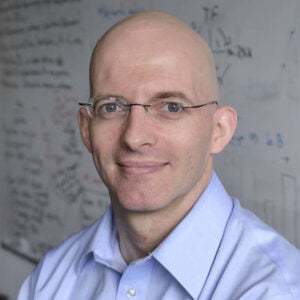Highlighting Dr. Martin Hemberg, Our 2023 Bisconti Fund Recipient
August 9, 2023
Computational biologist advancing the field of spatial transcriptomics Martin Hemberg selected for Bisconti Fund

Principal Investigator at the new Gene Lay Institute, Dr. Martin Hemberg has been selected as the 2023 Recipient of the Bisconti Fund for AI-Focused Research.
By Synclaire Oglesby
(BOSTON)– The Center for Computational Biomedicine (CCB) congratulates Martin Hemberg, Ph.D., as the distinguished recipient of our 2023 Bisconti Fund for AI-Focused Research. This award is designed to support innovative Artificial Intelligence (AI) solutions for biomedical research and healthcare.
Advancing Spatial Transcriptomics with a Novel Computational Framework
Dr. Hemberg’s research has focused on devising computational tools that leverage the potential of in situ transcriptomic profiling, often referred to as spatial transcriptomics. A groundbreaking method that allows scientists to measure the activity of hundreds of genes within intact tissue samples differing from previous methods that required the dissociation of cells from samples. By retaining spatial context, this profiling method provides valuable contextual data at a vastly higher spatial resolution.
The key challenge that Dr. Hemberg’s team aims to address is the limited ability to fully utilize the high spatial resolution provided by spatial transcriptomics data. To tackle this, they collaborated with the Hwang Lab from MGH to develop a novel computational framework for inferring cell-cell interactions. Their method, Spatially Constrained Optimal Transport Interaction Analysis (SCOTIA), has already been successfully used to identify interactions significant to therapeutic resistance in pancreatic ductal adenocarcinoma.
“Intuitively, spatial transcriptomics should offer an advantage over traditional single cell transcriptomics methods where cells are dissociated prior to profiling. Unfortunately, current methods are unable to take full advantage of the high spatial resolution provided by the latest technologies, and this is where our work comes in.“
M A R T I N H E M B E R G
With the support of the Bisconti award, Dr. Hemberg and his team plan to further enhance SCOTIA, making it more robust and user-friendly as a software package that can be easily integrated into existing workflows. Moreover, they will be implementing a refined, biophysically-motivated model of cellular interactions (specifically, ligand-receptor interactions) to improve detection over both short and long distances, providing valuable insights into cell communication and signaling within tissues.This tool will allow researchers to gain a better understanding of interactions in complex tissues and how they vary under different conditions, such as healthy vs. disease or mutant vs. wild-type.
Overall, Dr. Hemberg’s research has the potential to advance the rapidly expanding field of spatial transcriptomics by enabling a deeper understanding of cell interactions and their implications for various health conditions.
The Bisconti Fund
In addition to the awarded funding, totaling $50,000, CCB’s support and guidance will be available to the team as they navigate the complex challenges of transforming experimental research and healthcare through AI applications.
Generously funded by the Bisconti family, this 2023 cycle marks the award’s second presentation. If interested in applying, please find additional information here.